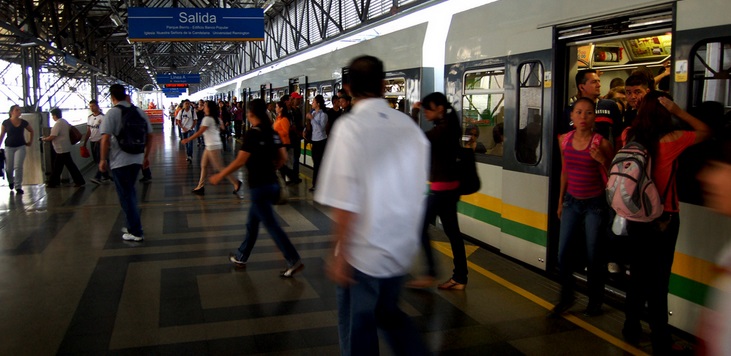
Metro station in Medellín. Photo on Flickr from user Omar Uran (CC BY 2.0).
This post is a slightly different version from the original published on Global Voices in Spanish.
Colombians are thinking twice about the treatment of passengers on the Medellín Metro, which almost half a million people ride every day. Recently, several incidents publicized online have raised awareness about the metro's draconian treatment of passengers.
On August 8, for instance, a video appeared of a young man playing the violin aboard a moving train. When police tried to remove him, a struggle ensued:
Five days later, metro officials evacuated an entire station, in response to another, larger musical demonstration aboard a moving train.
Responding to growing dissatisfaction with the city's train system, Medellín's government had this to say on Twitter:
Las normas de nuestro Metro están pensadas para una operación eficiente, segura y agradable para todos. #ElMetroesdeTodos
— Alcaldía de Medellín (@AlcaldiadeMed) agosto 15, 2014
The rules of our Metro are designed so that it can operate efficiently, securely, and enjoyably for everyone.
Internet users, meanwhile, have begun using the word “fascist” to describe the the train system's official rules, which are known as “Metro Culture.” For some online, however, the metro's excessive zeal is no revelation. Rosa Moreno writes:
Ve, a mi me ha parecido la “cultura metro” facha desde antes de que me quitaran la pauta.
— Rosa Moreno (@ismene2) August 14, 2014
See, to me, the “Metro Culture” has seemed fascist since before they removed the music.
The word “facha” that appears in Moreno's tweet derives from the Spanish word for “fascist.” In other words, accusations of “fascism” against the metro system are simultaneously meant as a criticisms of political conservatives, who are widely thought to support the restrictive conduct code aboard public transportation.
Santiago Villegas cautioned that getting emotional about incidents on the metro, even with eyewitness camera footage, can be unproductive.
¿Ya publicaron vídeos de lo sucedido en el Metro desde varios ángulos?¿Podemos ver antes de opinar o estamos siendo solo emotivos?
— Santiago Villegas C. (@medejean) August 14, 2014
Have videos of what happened in the Metro been posted from several angles already? Can we look at that before stating opinions, or are we just being emotional?
On August 13, protesting the violinist's expulsion days earlier, 11 people stood together aboard a train, silently reading poetry. Metro authorities responded to this noiseless demonstration by evacuating the train and halting station traffic.
Sergio Restrepo, one of the protesters, wrote online:
11 personas leyendo poesia en silencio el metro y respuesta evacuar estación pic.twitter.com/Uluf3ODDpX
— Sergio Restrepo (@sergiorestrepoj) agosto 14, 2014
11 people reading poetry in silence on the metro and the response is to evacuate the station.
Writer Héctor Abad Faciolince wrote on his blog about another incident aboard a train car that also reveals the excesses of the Metro's rules of conduct.
Tengo un amigo que iba en el metro de Medellín con una niña de brazos. Durante el viaje el bebé empezó a llorar, seguramente de hambre, y este amigo sacó el tetero que había preparado en la casa, para que se calmara. El bebé empezó a chupar. Casi de inmediato llegó un auxiliar de seguridad del metro y le advirtió con el índice: “En el metro de Medellín está prohibido comer”. Si no es porque la gente del vagón protesta, lo habrían obligado a quitarle el biberón al niño o a bajarse del tren. Así es la rigidez ridícula del metro de Medellín. Me imagino qué hubiera pasado si la esposa de este amigo hubiera sacado no el tetero sino la teta: quién dijo miedo. Además de alimentación, escándalo en lugar público, o mejor dicho, en el impoluto sistema metro de Medellín.
I have a friend who was on the metro in Medellín with a baby girl in his arms. During the trip, the baby began to cry, surely because she was hungry, and this friend took out the bottle he'd prepared at home, in order to calm her down. The baby began to suck on the bottle. Almost immediately, a metro security officer came up to him and informed him of the following: “Eating is prohibited on the Medellín metro.” If it weren't for the people who started to protest in the car, he would have been forced to take the bottle away from the child or get off the train. That is the ridiculous severity of the Medellín metro. I can only imagine what would have happened if this friend's wife began breastfeeding, instead of taking out a bottle: don't be afraid — just do it. In addition to eating, it would have been a scandal in a public place, or in the spotless Medellín metro system, rather.
While the metro system maintains it strict policies against disruptions aboard trains, Medellín passengers are likely to continue their resistance, until the widely unpopular code of conduct is changed.







2 comments
Cati,
With great respect, the transportation system is for the public at large. The public should be able to utilize the system with the expectation of safe and comfortable passage in a confined space. For those who desire to play the violin, saxophone, trumpet, horn, trombone, drums or even recite poetry the traveling public should not have to be unwitting subjects.